戏曲英文演讲稿
京剧(英文)演讲稿(5篇)
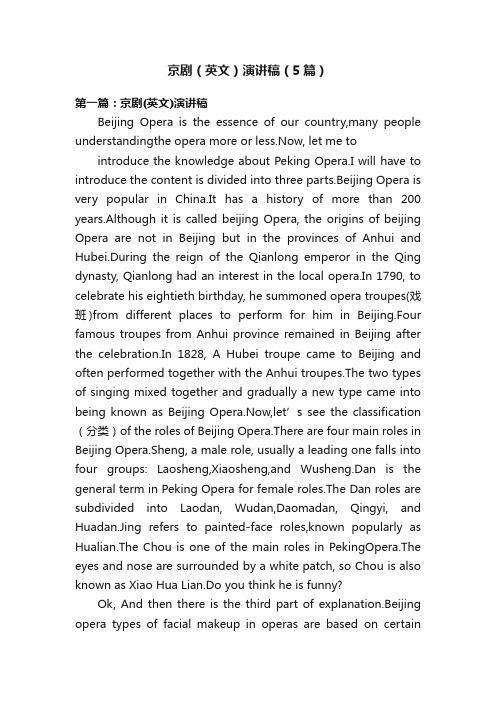
京剧(英文)演讲稿(5篇)第一篇:京剧(英文)演讲稿Beijing Opera is the essence of our country,many people understandingthe opera more or less.Now, let me to introduce the knowledge about Peking Opera.I will have to introduce the content is divided into three parts.Beijing Opera is very popular in China.It has a history of more than 200 years.Although it is called beijing Opera, the origins of beijing Opera are not in Beijing but in the provinces of Anhui and Hubei.During the reign of the Qianlong emperor in the Qing dynasty, Qianlong had an interest in the local opera.In 1790, to celebrate his eightieth birthday, he summoned opera troupes(戏班)from different places to perform for him in Beijing.Four famous troupes from Anhui province remained in Beijing after the celebration.In 1828, A Hubei troupe came to Beijing and often performed together with the Anhui troupes.The two types of singing mixed together and gradually a new type came into being known as Beijing O pera.Now,let’s see the classification (分类)of the roles of Beijing Opera.There are four main roles in Beijing Opera.Sheng, a male role, usually a leading one falls into four groups: Laosheng,Xiaosheng,and Wusheng.Dan is the general term in Peking Opera for female roles.The Dan roles are subdivided into Laodan, Wudan,Daomadan, Qingyi, and Huadan.Jing refers to painted-face roles,known popularly as Hualian.The Chou is one of the main roles in PekingOpera.The eyes and nose are surrounded by a white patch, so Chou is also known as Xiao Hua Lian.Do you think he is funny?Ok, And then there is the third part of explanation.Beijing opera types of facial makeup in operas are based on certainpersonality, temperament or some special types of figures for the use of certain colors.All right, finished watching Beijing Opera, I also have a few questions want to ask everyone.Beijing opera is a traditional fortune of our country.But she has standed an embarrassing situation where it's almost forgotten.We, especially us students, should take this issue seriously.And we should stick to it and spread it.In order to better promote Beijing Opera ,some Beijing Opera artists startedtrying to sing Beijing Opera in English.Besides, many parentsalso began to cultivate their children interest in Peking Opera.第二篇:京剧英文演讲稿November 16th in 2010,It was a common but also a special day,maybe most of people did not know that it was exactly from then on, there would be another list of world intangible cultural heritage item,a kind of old opera named after beijing recognized by the UNESCO.So after that,Beijing Opera has become the quintessence of our country.so we have the courage to believe that this art will be our wealth forever and will never disappear,because it was born among us and developed together with us.If we look it back we will be really proud of our nation and willing to pass this culture from generation to the next generation.2000 years ago, a famous Theatrical troupe named huiban began their exploration in this broaden city beijing.and this event has been recognized as the origin of opera development.It is said that in the whole world,there are three kinds of the oldest opera cultures:China opera, Greece tragic-comedy and Indian Sanskrit Opera, the former two just remain historical old stages,only China opera are still alive and develop.Because it is said that a nation's ancient art always carriesa national characteristic of the life,even can reflect the spirit of a nation,and it was always stay among people and involved in people’s lives.For most native people in old unmerceful time period,no matter who they are,the workers,the professors and other higher class,they were all absorbed in beijing opera,they regard it as their article of faith,they pull themselves out of this rushed society and comfort themselves with this life style.So it is really an essential part for peoples life.Another reason why it is important is that in the old time,there was no instrument for people to pass on knowlegde,actually,most part of the knowledge and social mobilities are passed by opera.戏曲比一切的书,比一切的学校起的作用都要大。
中国戏曲介绍英文作文

中国戏曲介绍英文作文英文:Chinese traditional opera, also known as Chinese opera, is a form of traditional Chinese performing arts that combines music, singing, dance, and martial arts. It has a long history and a rich cultural heritage, and is considered as one of the three major theatrical systems in the world, along with Western opera and Indian Sanskrit drama.There are many different types of Chinese opera, each with its own unique style and characteristics. Some of the most popular types include Peking Opera, Cantonese Opera, and Kunqu Opera. Peking Opera, also known as Beijing Opera, is the most well-known and widely performed type of Chinese opera. It originated in the late 18th century and is characterized by its elaborate costumes, colorful makeup, and acrobatic stunts. Cantonese Opera, on the other hand, is known for its lively music and singing, as well as itshumorous and satirical themes. Kunqu Opera, whichoriginated in the 14th century, is known for its poetic language and graceful movements.Chinese opera is not only a form of entertainment, but also a reflection of Chinese culture and history. It often tells stories of Chinese history, mythology, and legends, and is a way for people to learn about and appreciate Chinese culture. In addition, it has had a significant influence on other forms of Chinese art, such as literature, painting, and calligraphy.中文:中国传统戏曲,也称为中国戏剧,是一种传统的中国表演艺术形式,结合了音乐、唱歌、舞蹈和武术。
有关戏曲的英语作文

有关戏曲的英语作文有关戏曲的英语作文(通用5篇)无论在学习、工作或是生活中,大家都有写作文的经历,对作文很是熟悉吧,作文是人们把记忆中所存储的有关知识、经验和思想用书面形式表达出来的记叙方式。
你知道作文怎样才能写的好吗?下面是小编为大家整理的关于戏曲的英语作文,欢迎大家分享。
有关戏曲的英语作文篇1From the cartoon given above, we can observe that there are two people watching Peking Opera. With the actress performing vividly on the stage, the old man is watching attentively. However, the little boy sitting beside does not even take a glance at the actress and falls sleepy. It is obvious that he shows no interest in Peking Opera.The cartoon reveals the gradual loss of traditional culture in modern society.It is evident that the causes of this phenomenon are diverse.To begin with, the change of people ’s interests is the root cause. A typical example of this is that a large body of people has been attracted by foreign cultures, and richness —Crazy fans of foreign TV programs, electronic products or even ways of life abound in our daily life. Furthermore, the incorrect sense of traditional culture constitutes another majorcause. Quite a few people, especially youngsters, hold that Chinese traditional culture is out-dated and of little use in modern society. Perhaps, from their perspective, traditional culture form the distant past can hardly adapt to or keep pace with the ever-changing new world. Lastly, social ignorance plays a critical role in this matter/issue.However, no one can deny the significance of Chinese traditional culture. Without traditional culture, it is impossible forour young generation to develop our country and make it stronger. In addition, we should educate, advocate and encourage our friends, classmates, and acquaintances to reverse the decline in the emphasis of Chinese traditional culture. If we try our utmost to do so, the future of our country will be promising, hopeful and rosy.有关戏曲的英语作文篇2Peking Opera, once known as Ping opera, is one of the five major Chinese operas. The scene layout is mainly freehand brushwork, mainly with xipi and Erhuang, accompanied by huqin and gongs and drums. It is regarded as the essence of Chinese culture.中文翻译:京剧,曾被称为平剧,是中国五大戏曲之一,场景布局以写意为主,以西皮、二黄为主,胡琴、锣鼓伴奏,被视为中国文化的精髓,中国戏曲居世界京剧之首,以北京为代表11月,京剧被列入世界非物质文化遗产代表性名录。
戏曲英文演讲稿范文

戏曲英文演讲稿范文Title: The Enchanting World of Chinese Opera.Ladies and Gentlemen,。
Today, I am delighted to take you on a journey through the enchanting world of Chinese Opera, a performance art that embodies the essence of Chinese culture, history, and aesthetics. As we embark on this journey, I invite you to suspend your disbelief and immerse yourself in a world where passion, drama, and beauty coalesce into a compelling tapestry of sound, movement, and color.Chinese Opera, often referred to as "Xiqu" in Mandarin, is a highly stylized form of theatrical performance that dates back over 2,000 years. Its roots trace to the ancient music and dance rituals of the Zhou Dynasty, evolving over time to encompass a diverse repertoire of stories drawn from Chinese history, mythology, and literature. What sets Chinese Opera apart is its unique blend of music, dance,acting, acrobatics, and visual arts, all meticulously choreographed to convey emotional and narrative arcs with remarkable precision.The artform is known for its exquisitely detailed costumes, vibrant face painting, and elaborate stage settings. Each element serves to enhance the emotional impact of the performance, bringing to life the passions, conflicts, and triumphs of the characters. The costumes,for instance, are not just ornaments; they are symbols of status, personality, and emotional state. The face painting, known as "Xiehou," is an intricate art form that usescolors and patterns to reflect the character's nature and emotional state.The music of Chinese Opera is equally captivating, ranging from the sonorous melodies of the stringinstruments to the percussive rhythms of the drums and cymbals. The singing, often referred to as "Quan," ishighly stylized and requires exceptional skill and training. The actors, known as "Xingju," must master a complex repertoire of vocal techniques, including singing in highpitches and using a range of emotional inflections to convey the emotional nuances of their characters.The acting in Chinese Opera is no less remarkable. It requires the actors to undergo rigorous training in dance, acrobatics, and martial arts to perform the physically demanding routines that are a hallmark of the artform. These routines, known as "Wugong," are not just acrobatic displays; they are integral to the storytelling, used to communicate the emotional and psychological states of the characters.The plots of Chinese Opera are often drawn from historical events or mythical tales, many of which are deeply ingrained in Chinese culture and传统. These stories are not just narratives; they are vehicles for exploring themes of love, loyalty, honor, and sacrifice. The characters, whether heroes, villains, or comic relief, are often archetypes that resonate with the audience,reflecting the values and aspirations of Chinese society.The impact of Chinese Opera on Chinese culture cannotbe overstated. It has been a powerful medium for social commentary and political protest, often used to criticize social injustices and promote reform. It has also been a significant vehicle for the transmission of cultural values and historical knowledge, serving as a bridge between generations.In conclusion, Chinese Opera is not just a form of entertainment; it is a cultural treasure that embodies the spirit and soul of China. Its unique blend of music, dance, acting, and visual arts creates a powerful emotional experience that transcends cultural and linguistic barriers. As we celebrate the diversity and richness of world cultures, I invite you to embrace the enchanting world of Chinese Opera and let its beauty, passion, and drama touch your heart.Thank you.。
戏曲英文三分钟演讲稿简短

戏曲英文三分钟演讲稿简短Ladies and gentlemen,Today, I would like to talk to you about Chinese opera, which is known as "Xiqu" in the Chinese language. Chinese opera is a traditional form of performance art that dates back over a thousand years. It combines elements of singing, dancing, martial arts, and storytelling to create a unique and captivating experience.There are four main types of Chinese opera: Peking opera, Cantonese opera, Henan opera, and Sichuan opera. Each type has its own distinct style and characteristics, but they all share a common emphasis on colorful costumes, elaborate makeup, and exaggerated movements.One of the most famous forms of Chinese opera is Peking opera. It originated in the late 18th century and quickly gained popularity throughout the country. Peking opera is characterized by its use of arias, or singing styles, which convey emotions and tell the story. The performers also make use of intricate hand gestures, facial expressions, and acrobatic movements to bring the characters to life.Another prominent form of Chinese opera is Cantonese opera, which is popular in southern China, particularly in the Guangdong province. Cantonese opera has a more melodious and lively style compared to Peking opera. It features vibrant costumes, elaborate headpieces, and intricate movements. The performers often use a unique singing technique known as "maining," which involves a combination of speaking, singing, and chanting.Henan opera and Sichuan opera are less well-known outside of China but are still highly regarded within the country. Henan opera originated in the Henan province and is characterized by its simple melodies and lively dance movements. Sichuan opera, on the other hand, is known for its humorous and comedic elements, as well as its use of face-changing techniques. Performers can change masks instantaneously to portray different emotions and personalities.Chinese opera has had a significant influence on other forms of performing arts around the world. Its distinctive aesthetics and storytelling techniques have inspired many artists and filmmakers. Even today, Chinese opera continues to evolve and adapt to modern sensibilities, attracting new audiences both in China and internationally.In conclusion, Chinese opera is a vibrant and rich cultural tradition that embodies the essence of Chinese art and storytelling. Its colorful costumes, elaborate makeup, and dynamic performances make it a truly unique and captivating experience. Whether it is Peking opera, Cantonese opera, Henan opera, or Sichuan opera, one thing is for certain - Chinese opera is an art form that will continue to flourish and leave a lasting impact for generations to come.Thank you.。
京剧英文主题演讲稿带翻译

京剧英文主题演讲稿带翻译Ladies and gentlemen, good morning/afternoon/evening. It is my great honor to stand here and talk about one of the most traditional and influential Chinese performing arts Peking Opera, also known as Beijing Opera.女士们,先生们,早上好/下午好/晚上好。
我非常荣幸站在这里,谈论中国传统文化中最具影响力的表演艺术之一——京剧,也被称为北京京剧。
Peking Opera, with a history of over 200 years, is a comprehensive performing art that combines singing, acting, martial arts, and acrobatics. It originated in the late 18th century and became fully developed and recognized as a distinct form of opera in the mid-19th century. It is known for its unique vocal style, elaborate makeup, and magnificent costumes.京剧有着200多年的历史,是一种综合性的表演艺术,结合了唱、念、做、打等多种表现形式。
它起源于18世纪末,到了19世纪中叶,京剧成熟发展并被认可为一种独特的戏曲形式。
京剧以其独特的唱腔风格、精致的脸谱和华丽的服饰而闻名。
The themes of Peking Opera often revolve around Chinese history, folklore, and literary classics. It features a wide range of characters, from emperors and generals to humble peasants and crafty servants. The performances are accompanied by a small orchestra that plays traditional Chinese instruments, creating a rich and vibrant atmosphere.京剧的主题经常围绕中国历史、民间故事和文学经典。
戏曲传统艺术英语作文六
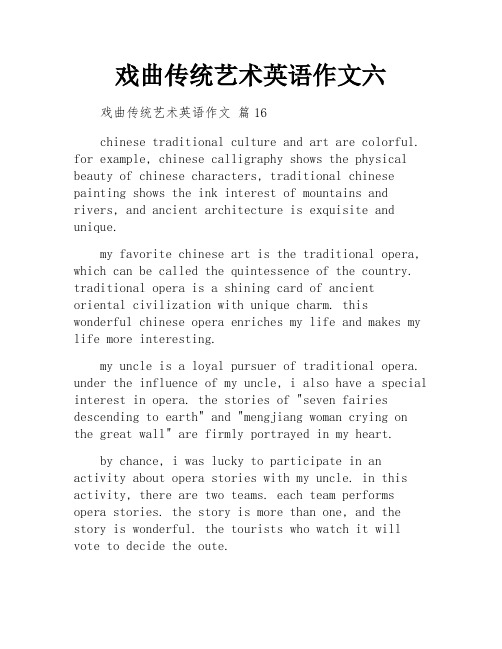
戏曲传统艺术英语作文六戏曲传统艺术英语作文篇16chinese traditional culture and art are colorful. for example, chinese calligraphy shows the physical beauty of chinese characters, traditional chinese painting shows the ink interest of mountains and rivers, and ancient architecture is exquisite and unique.my favorite chinese art is the traditional opera, which can be called the quintessence of the country. traditional opera is a shining card of ancientoriental civilization with unique charm. this wonderful chinese opera enriches my life and makes my life more interesting.my uncle is a loyal pursuer of traditional opera. under the influence of my uncle, i also have a special interest in opera. the stories of "seven fairies descending to earth" and "mengjiang woman crying on the great wall" are firmly portrayed in my heart.by chance, i was lucky to participate in anactivity about opera stories with my uncle. in this activity, there are two teams. each team performs opera stories. the story is more than one, and the story is wonderful. the tourists who watch it will vote to decide the oute.because the two teams have their owncharacteristics and the number of votes is equal, they are tied. it is not important to win or lose. what is important is that this activity makes people better understand the connotation of opera and have a strong interest in opera, which is of great significance. finally, two opera lovers sang a song to plete the activity.their loud songs have been lingering in my ears, "birds in pairs on the trees, green water and green mountains with a smile..." this is the ballad theysang on their way home after the enslavement period of the seventh princess of tianxian and dong yong. thisis a classic in huangmei opera, which is memorable. chinese opera enriches my life and makes my life more poetic.the classic of sichuan opera - face change. for me, it is magical, and the meaning of it is inprehensible. when i finished watching the face changing program, i pestered my uncle several times to ask about the essence of face changing. however, every time i getthe answer i don't want. "face changing is a classicof sichuan opera, and its implication is broad and profound, which is really difficult to understand with your current experience. if you really like opera, you should learn more knowledge and fill you with knowledge. without explaining, you will naturally understand the connotation of face changing." my uncle touched my head with his hand and answered me with akind smile. chinese opera enriches my life and makes my life more meaningful.i have personally experienced the hard work of practicing opera. just a simple action of throwing sleeves can make people fall into a state of madness. the sleeves of opera clothes are generally long. the long sleeves are put on the other arm and raised to the waist. the long sleeves are thrown out gracefully and naturally with both hands. the force should not be too large, otherwise it will not show the natural feeling of long sleeves floating. the force is too small, and you can't throw out long sleeves. if you want to throw out beautiful long sleeves, you still need some skills. chinese opera enriches my life and makes my life more interesting.traditional chinese opera can be called the quintessence of china. it is the shining business card of ancient oriental civilization. it cultivatespeople's sentiment and enriches my life.戏曲传统艺术英语作文篇17many people don't like watching plays, and almost all of them are old people. in fact, many people like singing and often see it on tv.why do most of us dislike going to the theatre so much in our time? there are many reasons. our family don't like watching plays on tv, but they like to watch them when others have a wedding at home. only atthis time, many people will go to see it because they sing very funny.on tv, i saw many people singing there, including children, adults and the elderly. they sing very well, but i don't like going to the theatre. i think everyone has their own ideas. i don't like going tothe theatre and singing because i think they play very fake and not very real. every time they see the old man play, i will go to see it from time to time. every time i see them play a crying play, i don't cry. i pretend. but acting is easy. some people still have a lot of people because it's so easy.will traditional chinese opera go or stay? i think i should stay. although i am not qualified to evaluate, as a chinese, it is necessary to speak. after all, opera is handed down by the ancestors, so it should be necessary to pass it on to our next generation.戏曲传统艺术英语作文篇18in order to let students understand the excellent tradition and cultural essence of the chinese nation and appreciate the charm of opera art, it was jointly sponsored by the 27th cpc publicity department, the27th district culture and tourism bureau, the 27th district education and sports bureau and the 27th district finance bureau, and undertaken by henan chaxiang village art troupe co., ltd; opera culture enters the campus; the activity entered xihudong primary school in erqi district.on the afternoon of november 28, the performance officially kicked off. the opera teacher interacted with the children and introduced the basic knowledge of opera, so that the children could mainly understand the aria of henan opera, qu opera and yuediao, the names of sheng, dan, jing and chou, as well as the basic knowledge of singing, reading, doing and playing of henan opera. stimulate children's interest in opera through munication.the activity lasted more than an hour. thisactivity focuses on children's sense of participation and experience. the whole activity was wonderful. the singing sound of the actors, the behind the scenes helping voice and the lively sound of gongs and drums were closely bined to form an extremely lively performance atmosphere. each program won bursts of applause on the spot.this activity has achieved established results, which not only creates a strong campus cultural atmosphere, allows students to fully understand opera and feel the charm of local opera, but also stimulates students to love traditional culture and their hometown.戏曲传统艺术英语作文篇19this afternoon, after the morning sports meeting, our school began another important activity - opera into the campus. like the children, i look forward to it very much.after the children arrived at school in the afternoon, we organized the children to go to the playground to watch the wonderful performance brought by the opera teachers. after a while, the music sounded, and the chirping voice of the children on the playground suddenly quieted down. one by one, they appeared on the stage in big costumes. the wonderful performance began, and the children were very involved in it. after a table is finished. opera teachers began to popularize opera knowledge to children. sheng dan, jing mo, chou, and various musical instruments. the children listened very carefully. the next link was to teach the children to sing the classic excerpts of hua mulan. at the same time, i also enjoyed "mu guiying in mand" and other famous classic passages.while playing, children also learn a lot of knowledge. this kind of knowledge learned in the invisible is very much. i also hope that a lot of knowledge can be accepted and absorbed by children unknowingly in this way.。
京剧英文主题演讲稿五年级

京剧英文主题演讲稿五年级京剧英文主题演讲稿。
Ladies and gentlemen, boys and girls,。
Today, I am honored to stand here and talk to you about one of the most traditional and fascinating forms of Chinese opera – Peking Opera, also known as Beijing Opera. As a fifth grader, I am excited to share with you some interesting facts and stories about this unique art form.Peking Opera is a traditional Chinese art that combines music, vocal performance, mime, dance, and acrobatics. It originated in the late 18th century and has been passed down through generations, becoming an integral part of Chinese culture. The performers in Peking Opera wear elaborate costumes and makeup, and their movements are highly stylized and symbolic.One of the most distinctive features of Peking Opera is the use of facial makeup, or "jing", which represents the characters' personalities, traits, and emotions. For example, a red face symbolizes bravery and loyalty, while a white face represents treachery and evil. The elaborate makeup adds to the visual appeal of the performance and helps the audience understand the characters' inner thoughts and feelings.In addition to the makeup, Peking Opera is also known for its unique vocal style. The performers use a combination of singing, speaking, and reciting to convey the emotions and intentions of the characters. The music in Peking Opera is accompanied by traditional Chinese instruments such as the erhu, pipa, and gong, creating a rich and vibrant sound that enhances the overall experience.Furthermore, Peking Opera is famous for its acrobatic stunts and martial arts movements. The performers execute daring flips, jumps, and somersaults, showcasing their agility and strength. These acrobatic elements add excitement and energy to the performances, captivating the audience and leaving them in awe of the performers' skills.As a young fan of Peking Opera, I have had the opportunity to watch several performances and have been amazed by the talent and dedication of the performers. The stories told in Peking Opera often revolve around themes of loyalty, love, and heroism, and the characters face various challenges and conflicts. Through their performances, the actors convey the values and virtues of traditional Chinese culture, inspiring and educating the audience.In conclusion, Peking Opera is a treasured art form that has been cherished for centuries. Its unique blend of music, vocal performance, acrobatics, and storytelling makes it a truly remarkable cultural heritage of China. I hope that through my speech, you have gained a deeper appreciation for Peking Opera and will consider exploring this beautiful and captivating art form.Thank you for listening.。
关于戏曲的英语作文初一万能英语作文5篇
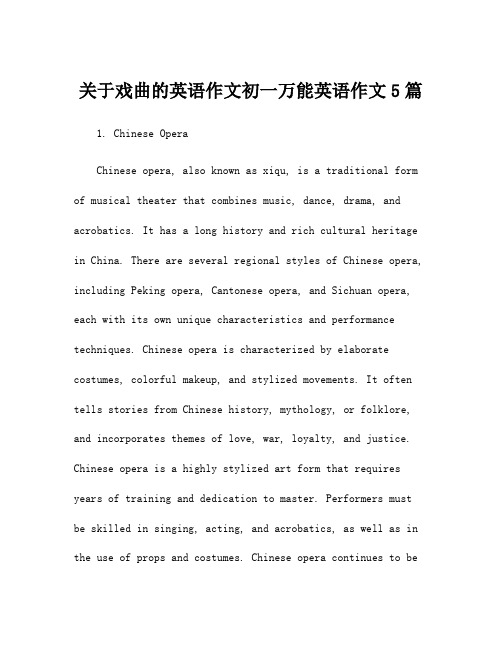
关于戏曲的英语作文初一万能英语作文5篇1. Chinese OperaChinese opera, also known as xiqu, is a traditional form of musical theater that combines music, dance, drama, and acrobatics. It has a long history and rich cultural heritage in China. There are several regional styles of Chinese opera, including Peking opera, Cantonese opera, and Sichuan opera, each with its own unique characteristics and performance techniques. Chinese opera is characterized by elaborate costumes, colorful makeup, and stylized movements. It often tells stories from Chinese history, mythology, or folklore, and incorporates themes of love, war, loyalty, and justice. Chinese opera is a highly stylized art form that requires years of training and dedication to master. Performers must be skilled in singing, acting, and acrobatics, as well as in the use of props and costumes. Chinese opera continues to bepopular in China and has gained international recognition for its beauty and artistry.2. The History of Peking OperaPeking opera, also known as Beijing opera, is one of the most famous styles of Chinese opera. It originated in thelate 18th century in Beijing and quickly became popular throughout China. Peking opera combines music, singing, acting, and acrobatics to tell stories from Chinese history, mythology, and literature. Performers in Peking opera wear elaborate costumes and makeup to represent different characters, such as warriors, scholars, and royalty. Themusic in Peking opera is traditionally performed with instruments like drums, gongs, and stringed instruments. Peking opera has a unique performance style that includes acrobatic movements, stylized gestures, and vocal techniques. The stories in Peking opera often center on themes of loyalty, honor, and love, and feature elaborate fight scenes anddramatic confrontations. Peking opera continues to be performed in China and around the world, and is recognizedfor its cultural significance and artistic beauty.3. The Art of Cantonese OperaCantonese opera is a traditional form of Chinese opera that originated in the southern region of Guangdong province. It is known for its colorful costumes, elaborate makeup, and vibrant music. Cantonese opera combines singing, acting, and acrobatics to tell stories from Chinese history, mythology, and folklore. Performers in Cantonese opera often play archetypal characters such as heroes, villains, and lovers. Cantonese opera features a unique style of singing, known as "mou yim," which combines spoken dialogue with melodic songs. The music in Cantonese opera is performed with traditional Chinese instruments such as the bamboo flute, pipa, and erhu. Cantonese opera is a highly stylized art form that requires years of training and dedication to master. Performers mustbe skilled in singing, acting, acrobatics, and martial arts. Cantonese opera continues to be popular in southern China and has a dedicated following of enthusiasts who appreciate its cultural significance and artistic beauty.4. The Beauty of Sichuan OperaSichuan opera is a traditional form of Chinese opera that originated in the southwestern province of Sichuan. It is known for its lively performances, comedic skits, and face-changing techniques. Sichuan opera combines singing, acting, and acrobatics to tell stories from Chinese history, mythology, and folklore. Performers in Sichuan opera wear elaborate costumes and makeup, including masks that represent different characters and emotions. Sichuan opera features a unique style of singing, known as "bian lian," which involves the rapid changing of masks to reveal different facial expressions. The music in Sichuan opera is performed with traditional Chinese instruments such as the bamboo flute,gongs, and drums. Sichuan opera is famous for its face-changing techniques, in which performers change masks in the blink of an eye to create dramatic effects. Sichuan opera continues to be popular in China and has gained international recognition for its entertaining performances and skilled performers.5. The Future of Chinese OperaChinese opera has a long history and rich cultural heritage in China. While traditional forms of Chinese opera such as Peking opera, Cantonese opera, and Sichuan opera continue to be popular, there is also a growing interest in modern adaptations and innovations. Contemporary Chinese opera companies are experimenting with new forms of storytelling, incorporating elements of Western theater, dance, and music. Chinese opera is evolving to reach new audiences and stay relevant in a rapidly changing world. The future of Chinese opera lies in its ability to adapt andinnovate while preserving its traditional roots and artistic integrity. As China continues to grow and develop, Chinese opera will remain a vibrant and dynamic art form that reflects the rich cultural heritage and creative spirit of the Chinese people.。
戏曲表演英文作文
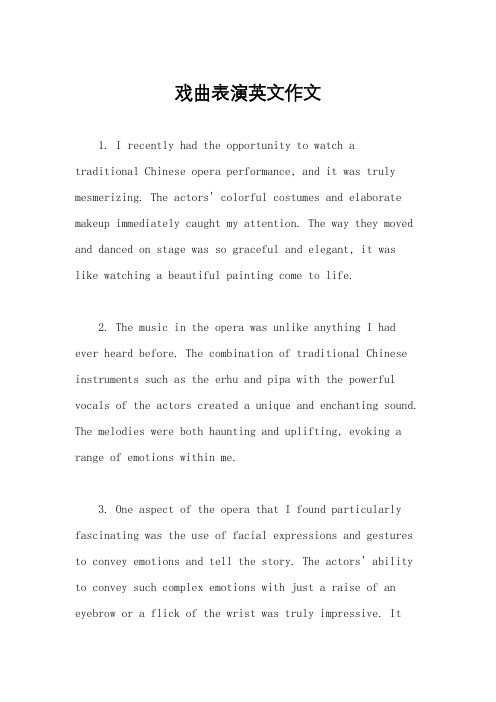
戏曲表演英文作文1. I recently had the opportunity to watch atraditional Chinese opera performance, and it was truly mesmerizing. The actors' colorful costumes and elaborate makeup immediately caught my attention. The way they moved and danced on stage was so graceful and elegant, it waslike watching a beautiful painting come to life.2. The music in the opera was unlike anything I had ever heard before. The combination of traditional Chinese instruments such as the erhu and pipa with the powerful vocals of the actors created a unique and enchanting sound. The melodies were both haunting and uplifting, evoking a range of emotions within me.3. One aspect of the opera that I found particularly fascinating was the use of facial expressions and gestures to convey emotions and tell the story. The actors' ability to convey such complex emotions with just a raise of an eyebrow or a flick of the wrist was truly impressive. Itadded a layer of depth and nuance to the performance that I had not seen in other forms of theater.4. The storytelling in the opera was also captivating. The stories were often based on historical events or famous literary works, and they were filled with drama, romance, and tragedy. The actors' ability to bring these stories to life and make the audience feel a part of the narrative was truly remarkable.5. Another aspect of the opera that I found interesting was the use of acrobatics and martial arts. The actorswould perform breathtaking stunts and fight scenes, adding an element of excitement and action to the performance. It was a perfect blend of artistry and athleticism.6. The audience's reaction to the opera was also worth mentioning. People were completely engrossed in the performance, applauding and cheering at the end of each act. It was clear that the opera had a strong emotional impacton the audience, and it was a shared experience thatbrought people together.7. Overall, watching a traditional Chinese opera was a truly unforgettable experience. The combination of stunning visuals, mesmerizing music, and captivating storytelling made it a feast for the senses. It's a form of art that has been passed down through generations and continues to enchant audiences around the world. I feel fortunate to have witnessed it firsthand and would highly recommend it to anyone interested in experiencing the rich cultural heritage of China.。
中国戏曲介绍英文作文
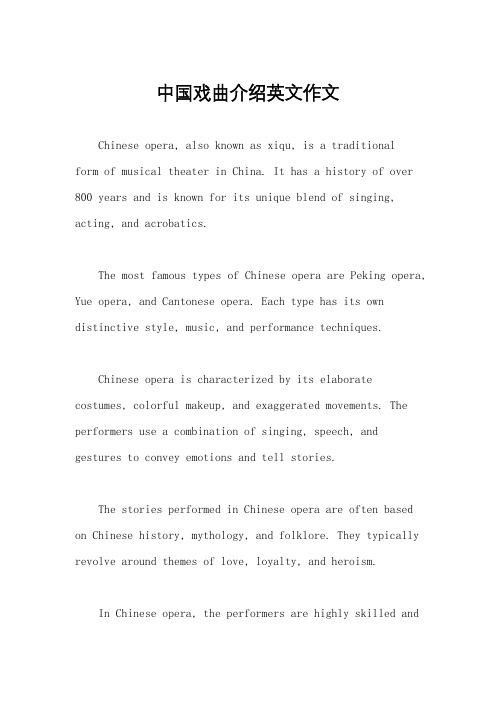
中国戏曲介绍英文作文Chinese opera, also known as xiqu, is a traditionalform of musical theater in China. It has a history of over 800 years and is known for its unique blend of singing, acting, and acrobatics.The most famous types of Chinese opera are Peking opera, Yue opera, and Cantonese opera. Each type has its own distinctive style, music, and performance techniques.Chinese opera is characterized by its elaborate costumes, colorful makeup, and exaggerated movements. The performers use a combination of singing, speech, and gestures to convey emotions and tell stories.The stories performed in Chinese opera are often based on Chinese history, mythology, and folklore. They typically revolve around themes of love, loyalty, and heroism.In Chinese opera, the performers are highly skilled andundergo years of rigorous training. They must master the art of singing, acting, and acrobatics, as well as learn the intricate movements and gestures that are unique to each type of opera.Chinese opera is an important part of Chinese cultural heritage and has been recognized as a UNESCO Intangible Cultural Heritage. It continues to be performed and appreciated by audiences around the world.。
传承戏曲的英语作文
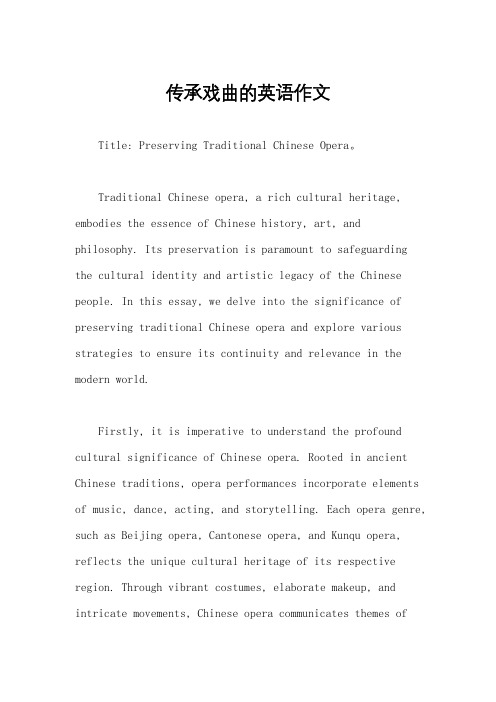
传承戏曲的英语作文Title: Preserving Traditional Chinese Opera。
Traditional Chinese opera, a rich cultural heritage, embodies the essence of Chinese history, art, and philosophy. Its preservation is paramount to safeguarding the cultural identity and artistic legacy of the Chinese people. In this essay, we delve into the significance of preserving traditional Chinese opera and explore various strategies to ensure its continuity and relevance in the modern world.Firstly, it is imperative to understand the profound cultural significance of Chinese opera. Rooted in ancient Chinese traditions, opera performances incorporate elements of music, dance, acting, and storytelling. Each opera genre, such as Beijing opera, Cantonese opera, and Kunqu opera, reflects the unique cultural heritage of its respective region. Through vibrant costumes, elaborate makeup, and intricate movements, Chinese opera communicates themes oflove, loyalty, morality, and heroism, resonating with audiences across generations.The preservation of traditional Chinese opera is essential for maintaining cultural continuity and identity. As China undergoes rapid modernization and globalization, there is a risk of traditional art forms being overshadowed by Western influences. Therefore, efforts must be made to promote awareness and appreciation of Chinese opera among younger generations. Educational initiatives, such as integrating opera appreciation into school curricula and organizing workshops and performances in communities, can foster a deeper understanding and connection to this ancient art form.Furthermore, technological advancements offer new opportunities for preserving and promoting Chinese opera on a global scale. Digital platforms and online streaming services can disseminate opera performances to a wider audience, transcending geographical boundaries. Collaborations between traditional opera troupes and modern media companies can create innovative productions thatappeal to contemporary sensibilities while preserving the integrity of the art form.Additionally, financial support and government patronage are crucial for sustaining traditional opera troupes and training the next generation of performers. Subsidies, grants, and cultural preservation funds can alleviate financial constraints and enable opera companies to stage high-quality productions and provide comprehensive training programs. Moreover, policies that recognize and protect intangible cultural heritage, including Chinese opera, are essential for safeguarding its legacy for future generations.Collaboration with international cultural institutions and exchanges can also enhance the visibility and appreciation of Chinese opera on the global stage. Cultural exchanges, joint productions, and participation in international festivals enable Chinese opera performers to showcase their talent and heritage to audiences worldwide, fostering cross-cultural understanding and appreciation.In conclusion, the preservation of traditional Chinese opera is a multifaceted endeavor that requires concerted efforts from various stakeholders, including government agencies, cultural institutions, educators, performers, and the general public. By recognizing the culturalsignificance of Chinese opera, harnessing technological innovations, providing financial support, and fostering international collaborations, we can ensure the continuity and relevance of this ancient art form for generations to come. Only through collective action and unwavering dedication can we preserve the cultural legacy oftraditional Chinese opera for future audiences to cherish and enjoy.。
戏曲主题英语演讲稿范文
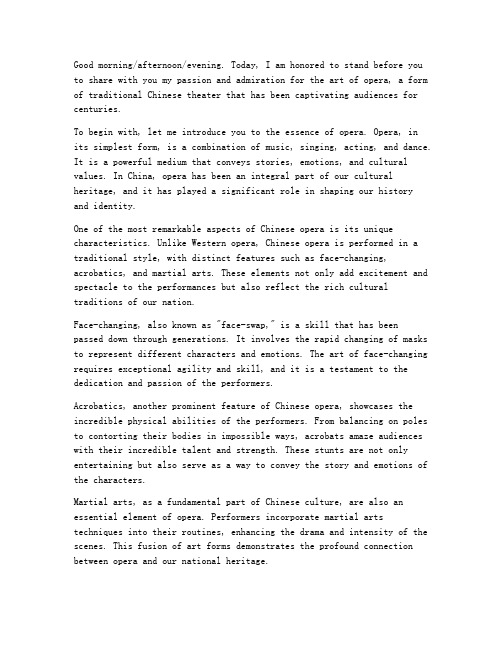
Good morning/afternoon/evening. Today, I am honored to stand before you to share with you my passion and admiration for the art of opera, a form of traditional Chinese theater that has been captivating audiences for centuries.To begin with, let me introduce you to the essence of opera. Opera, inits simplest form, is a combination of music, singing, acting, and dance. It is a powerful medium that conveys stories, emotions, and cultural values. In China, opera has been an integral part of our cultural heritage, and it has played a significant role in shaping our historyand identity.One of the most remarkable aspects of Chinese opera is its unique characteristics. Unlike Western opera, Chinese opera is performed in a traditional style, with distinct features such as face-changing, acrobatics, and martial arts. These elements not only add excitement and spectacle to the performances but also reflect the rich cultural traditions of our nation.Face-changing, also known as "face-swap," is a skill that has been passed down through generations. It involves the rapid changing of masks to represent different characters and emotions. The art of face-changing requires exceptional agility and skill, and it is a testament to the dedication and passion of the performers.Acrobatics, another prominent feature of Chinese opera, showcases the incredible physical abilities of the performers. From balancing on poles to contorting their bodies in impossible ways, acrobats amaze audiences with their incredible talent and strength. These stunts are not only entertaining but also serve as a way to convey the story and emotions of the characters.Martial arts, as a fundamental part of Chinese culture, are also an essential element of opera. Performers incorporate martial arts techniques into their routines, enhancing the drama and intensity of the scenes. This fusion of art forms demonstrates the profound connection between opera and our national heritage.Now, let us delve into the historical significance of Chinese opera. Its origins can be traced back to the Tang Dynasty (618-907 AD), but it was during the Ming Dynasty (1368-1644 AD) that opera reached its peak. During this period, various opera forms emerged, such as Peking Opera, Kunqu Opera, and Sichuan Opera, each with its unique style and characteristics.Peking Opera, the most famous and representative form of Chinese opera, is known for its elaborate costumes, colorful makeup, and dramatic performances. It has become a symbol of Chinese culture, attracting audiences from all over the world. The combination of music, singing, acting, and dance in Peking Opera creates a mesmerizing experience that leaves a lasting impression on the audience.Kunqu Opera, on the other hand, is characterized by its elegant and graceful movements, lyrical melodies, and refined acting. It originated in the region of Kunshan, near Suzhou, and has been recognized as a UNESCO Intangible Cultural Heritage. Kunqu Opera represents the highest level of artistic achievement in traditional Chinese opera.Sichuan Opera, known for its distinctive face-changing techniques and acrobatic performances, is another popular form of Chinese opera. It originated in the Sichuan province and has a rich history of more than 2,000 years. Sichuan Opera is famous for its vibrant colors, lively music, and humorous dialogues, making it a favorite among audiences.As a traditional art form, Chinese opera has faced numerous challenges over the years. The rise of modern entertainment, such as movies and television, has led to a decline in the popularity of traditional theater. However, efforts have been made to preserve and promote this invaluable cultural heritage.Today, Chinese opera is not only a form of entertainment but also an educational tool. It serves as a means to transmit our cultural values and traditions to future generations. Through opera, we can learn about our history, understand our customs, and appreciate the beauty of our nation.In conclusion, Chinese opera is a remarkable art form that embodies the essence of our cultural heritage. It showcases the unique characteristics of our nation, such as face-changing, acrobatics, and martial arts, and has played a significant role in shaping our history and identity. As we move forward, it is essential to preserve and promote this invaluable cultural heritage, ensuring that future generations can appreciate and enjoy the beauty of Chinese opera.Thank you for your attention, and I hope you have gained a deeper understanding and appreciation of the art of opera. Let us continue to cherish and pass on this magnificent tradition for generations to come.。
戏曲传承英语作文
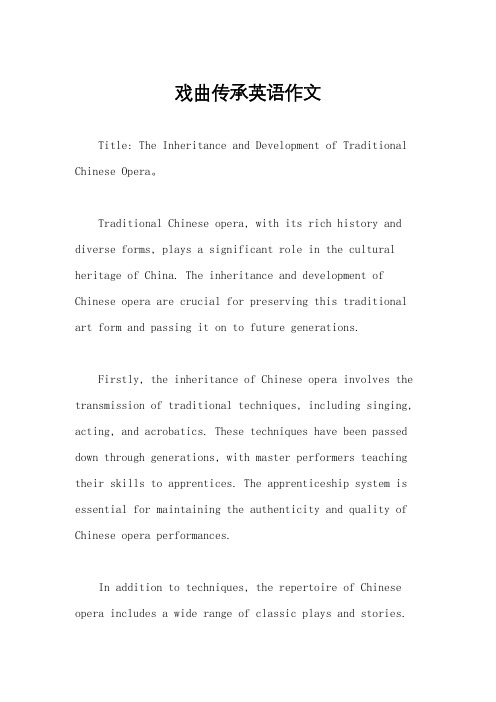
戏曲传承英语作文Title: The Inheritance and Development of Traditional Chinese Opera。
Traditional Chinese opera, with its rich history and diverse forms, plays a significant role in the cultural heritage of China. The inheritance and development of Chinese opera are crucial for preserving this traditional art form and passing it on to future generations.Firstly, the inheritance of Chinese opera involves the transmission of traditional techniques, including singing, acting, and acrobatics. These techniques have been passed down through generations, with master performers teaching their skills to apprentices. The apprenticeship system is essential for maintaining the authenticity and quality of Chinese opera performances.In addition to techniques, the repertoire of Chinese opera includes a wide range of classic plays and stories.These stories often draw from Chinese history, mythology, and folklore, reflecting the values and beliefs of Chinese culture. The inheritance of these stories is vital for preserving the cultural identity of Chinese opera.Moreover, the development of Chinese opera involves innovation and adaptation to contemporary audiences. While traditional techniques and stories form the foundation of Chinese opera, modern performers are also exploring new ways to interpret and present this art form. For example, some opera companies are experimenting with multimedia technology to enhance their productions, while others are collaborating with artists from different cultural backgrounds to create fusion performances.Furthermore, the promotion of Chinese opera involves raising awareness and appreciation of this art form among the general public. This includes educational programs in schools, as well as outreach initiatives in local communities. By exposing more people to Chinese opera, we can ensure its continued relevance and popularity in modern society.In conclusion, the inheritance and development of traditional Chinese opera are essential for preserving this cultural heritage and passing it on to future generations. By maintaining traditional techniques and stories while also embracing innovation and adaptation, Chinese opera can continue to thrive in the 21st century and beyond.。
有关京剧的英文演讲
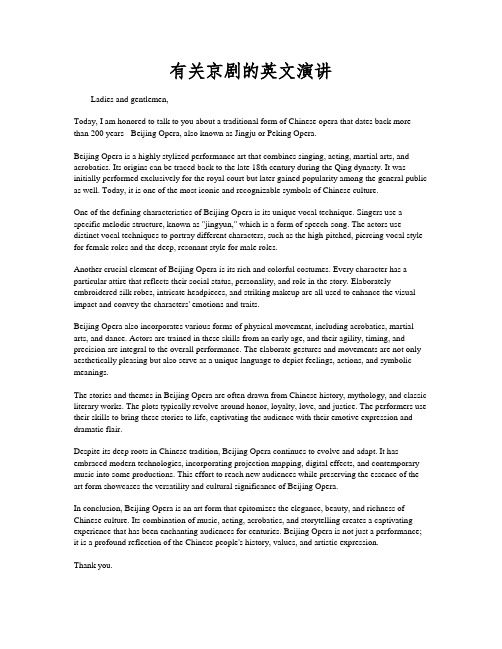
有关京剧的英文演讲Ladies and gentlemen,Today, I am honored to talk to you about a traditional form of Chinese opera that dates back more than 200 years - Beijing Opera, also known as Jingju or Peking Opera.Beijing Opera is a highly stylized performance art that combines singing, acting, martial arts, and acrobatics. Its origins can be traced back to the late 18th century during the Qing dynasty. It was initially performed exclusively for the royal court but later gained popularity among the general public as well. Today, it is one of the most iconic and recognizable symbols of Chinese culture.One of the defining characteristics of Beijing Opera is its unique vocal technique. Singers use a specific melodic structure, known as "jingyun," which is a form of speech-song. The actors use distinct vocal techniques to portray different characters, such as the high-pitched, piercing vocal style for female roles and the deep, resonant style for male roles.Another crucial element of Beijing Opera is its rich and colorful costumes. Every character has a particular attire that reflects their social status, personality, and role in the story. Elaborately embroidered silk robes, intricate headpieces, and striking makeup are all used to enhance the visual impact and convey the characters' emotions and traits.Beijing Opera also incorporates various forms of physical movement, including acrobatics, martial arts, and dance. Actors are trained in these skills from an early age, and their agility, timing, and precision are integral to the overall performance. The elaborate gestures and movements are not only aesthetically pleasing but also serve as a unique language to depict feelings, actions, and symbolic meanings.The stories and themes in Beijing Opera are often drawn from Chinese history, mythology, and classic literary works. The plots typically revolve around honor, loyalty, love, and justice. The performers use their skills to bring these stories to life, captivating the audience with their emotive expression and dramatic flair.Despite its deep roots in Chinese tradition, Beijing Opera continues to evolve and adapt. It has embraced modern technologies, incorporating projection mapping, digital effects, and contemporary music into some productions. This effort to reach new audiences while preserving the essence of the art form showcases the versatility and cultural significance of Beijing Opera.In conclusion, Beijing Opera is an art form that epitomizes the elegance, beauty, and richness of Chinese culture. Its combination of music, acting, acrobatics, and storytelling creates a captivating experience that has been enchanting audiences for centuries. Beijing Opera is not just a performance; it is a profound reflection of the Chinese people's history, values, and artistic expression.Thank you.。
英语京剧讲座作文模板
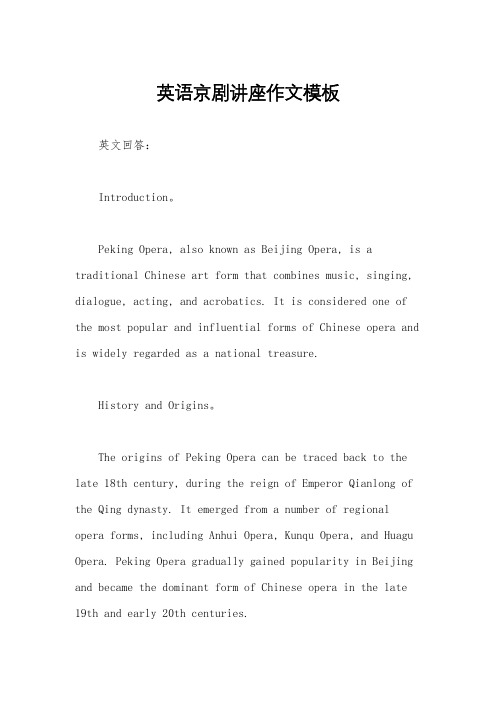
英语京剧讲座作文模板英文回答:Introduction。
Peking Opera, also known as Beijing Opera, is a traditional Chinese art form that combines music, singing, dialogue, acting, and acrobatics. It is considered one of the most popular and influential forms of Chinese opera and is widely regarded as a national treasure.History and Origins。
The origins of Peking Opera can be traced back to the late 18th century, during the reign of Emperor Qianlong of the Qing dynasty. It emerged from a number of regional opera forms, including Anhui Opera, Kunqu Opera, and Huagu Opera. Peking Opera gradually gained popularity in Beijing and became the dominant form of Chinese opera in the late 19th and early 20th centuries.Characteristics of Peking Opera。
Peking Opera is known for its distinctive characteristics, which include:Elaborate costumes: The costumes of Peking Opera are highly ornamented and colorful, with vibrant colors and intricate embroidery. They are designed to represent the characters' social status, personality, and role in the story.Stylized makeup: Peking Opera performers use highly stylized makeup to create striking and iconic characters. The makeup patterns and colors are used to convey the characters' personalities, emotions, and status.Singing: Peking Opera singing is characterized by its highly melodic and recitative style. The singers use a wide vocal range and a variety of techniques to express emotions and convey the story.Martial arts: Peking Opera often incorporates martial arts into its performances, including acrobatics, swordplay, and hand-to-hand combat. These elements add excitement and spectacle to the stage.Live accompaniment: Peking Opera is accompanied by a small orchestra of traditional Chinese instruments,including gongs, drums, cymbals, and stringed instruments. The music provides a rhythmic and melodic foundation forthe performance.Themes and Repertoire。
中国戏曲英文演讲稿范文
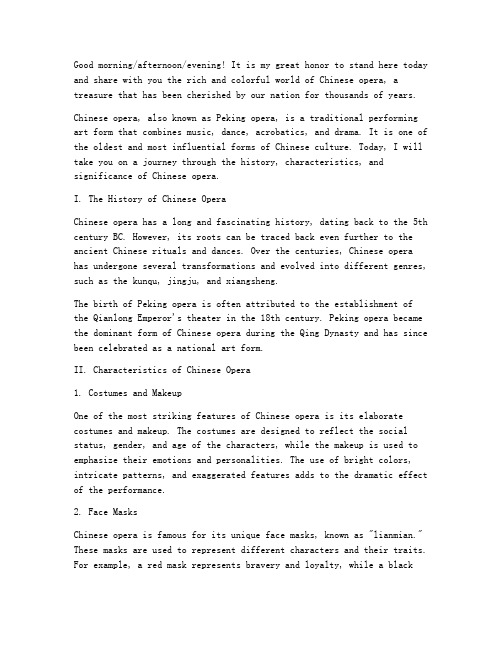
Good morning/afternoon/evening! It is my great honor to stand here today and share with you the rich and colorful world of Chinese opera, a treasure that has been cherished by our nation for thousands of years.Chinese opera, also known as Peking opera, is a traditional performing art form that combines music, dance, acrobatics, and drama. It is one of the oldest and most influential forms of Chinese culture. Today, I will take you on a journey through the history, characteristics, and significance of Chinese opera.I. The History of Chinese OperaChinese opera has a long and fascinating history, dating back to the 5th century BC. However, its roots can be traced back even further to the ancient Chinese rituals and dances. Over the centuries, Chinese opera has undergone several transformations and evolved into different genres, such as the kunqu, jingju, and xiangsheng.The birth of Peking opera is often attributed to the establishment of the Qianlong Emperor's theater in the 18th century. Peking opera became the dominant form of Chinese opera during the Qing Dynasty and has since been celebrated as a national art form.II. Characteristics of Chinese Opera1. Costumes and MakeupOne of the most striking features of Chinese opera is its elaborate costumes and makeup. The costumes are designed to reflect the social status, gender, and age of the characters, while the makeup is used to emphasize their emotions and personalities. The use of bright colors, intricate patterns, and exaggerated features adds to the dramatic effect of the performance.2. Face MasksChinese opera is famous for its unique face masks, known as "lianmian." These masks are used to represent different characters and their traits. For example, a red mask represents bravery and loyalty, while a blackmask symbolizes wisdom and integrity. The use of face masks adds a distinctive visual appeal to the performances.3. Music and SingingThe music and singing in Chinese opera are an integral part of the art form. The melodies are typically based on folk music and traditional instruments, such as the erhu (a two-stringed fiddle) and the guzheng (a seven-stringed zither). The singing is characterized by its unique intonation, rhythm, and expressiveness.4. Performance TechniquesChinese opera is known for its incredible acrobatic skills and martial arts performances. The performers undergo rigorous training to master these techniques, which are often integrated into the storylines of the plays. The combination of dance, music, and acrobatics creates a dynamic and engaging experience for the audience.III. The Significance of Chinese Opera1. Cultural HeritageChinese opera is a significant part of our cultural heritage. Itreflects the values, beliefs, and customs of our ancestors and serves as a reminder of our rich history. By preserving and promoting Chinese opera, we are able to pass on our cultural identity to future generations.2. Artistic ExpressionChinese opera is a powerful medium for artistic expression. It allows performers to convey complex emotions and narratives through music, dance, and drama. The art form has inspired countless playwrights, composers, and dancers, and continues to captivate audiences worldwide.3. Social and Political CommentaryThroughout history, Chinese opera has been used as a platform for social and political commentary. Performers have used the art form to expose corruption, criticize the ruling class, and advocate for social justice.This aspect of Chinese opera makes it an essential tool for preserving our national memory and promoting social progress.IV. The Future of Chinese OperaDespite the challenges it faces, such as the aging population of performers and the competition from modern entertainment, Chinese opera continues to thrive. Efforts are being made to preserve and revitalize this ancient art form, including the training of new performers, the creation of new works, and the promotion of Chinese opera internationally.In conclusion, Chinese opera is a unique and vibrant art form that has enriched our cultural landscape for thousands of years. Its history, characteristics, and significance make it an essential part of our cultural heritage. Let us continue to cherish and promote this precious treasure, so that it may continue to captivate audiences for generations to come.Thank you for your attention, and I hope you have gained a deeper appreciation for the wonders of Chinese opera.。
演讲京剧英语作文范文

演讲京剧英语作文范文Beijing Opera: A Symphony of Tradition and Innovation.In the rich tapestry of performing arts, Beijing Opera stands as a vibrant and enduring masterpiece, captivating audiences with its mesmerizing blend of music, dance, and drama. With a history spanning centuries, Beijing Opera has evolved into an iconic symbol of Chinese culture, transcending geographical and linguistic barriers to enchant and inspire.At the heart of Beijing Opera lies the concept of "xiqu," a genre encompassing not only singing and dancing but also a complex system of stylized gestures, makeup, and costumes. Each element is meticulously orchestrated to create a vivid and evocative theatrical experience.The vocal performance in Beijing Opera is characterized by its distinct use of falsetto and vibrato, resulting in a powerful and expressive sound. Singers are trained from ayoung age to master a wide range of vocal techniques, including the use of "kouban" (nasal resonance) and "huaqiang" (head voice).Complementing the vocals is the intricate choreography of Beijing Opera. Dancers move with grace and fluidity, employing stylized gestures and postures that convey a myriad of emotions and actions. The movements are often highly symbolic, evoking imagery of battles, courtly rituals, or everyday life.The costumes and makeup in Beijing Opera are equally elaborate and evocative. Performers wear elaborate robes adorned with intricate embroidery and vibrant colors. The makeup is highly stylized, with each character having a specific design that reflects their personality and status. The combination of costumes and makeup creates a visual feast that transports audiences to another era.Beyond its technical virtuosity, Beijing Opera also carries deep cultural significance. The stories and characters depicted in its repertoire often drawinspiration from Chinese history, literature, and folklore. Through these performances, audiences are not only entertained but also gain insights into the values, beliefs, and aspirations of the Chinese people.In recent years, Beijing Opera has faced challenges in maintaining its relevance in a rapidly changing world. However, innovative artists and performers are constantly seeking ways to adapt and modernize this beloved art form. Contemporary productions incorporate elements from other genres, such as Western opera and modern dance, while still preserving the core traditions of Beijing Opera.One notable example is the work of Zhang Yimou, the renowned Chinese filmmaker. In his 2008 production of "Turandot," Zhang fused Beijing Opera with Westernclassical music and acrobatics, creating a spectacular and critically acclaimed spectacle.Another example is the emergence of "small theater" Beijing Opera. These productions are staged in intimate venues, often with a reduced cast and a more experimentalapproach to storytelling. This new format allows for greater flexibility and innovation, while still showcasing the essence of Beijing Opera.The preservation and revitalization of Beijing Opera is a testament to its enduring appeal and cultural significance. It is an art form that continues to inspire and captivate audiences worldwide, offering a glimpse into the rich and vibrant tapestry of Chinese culture.As the world continues to evolve, Beijing Opera remains a beacon of tradition and innovation. By embracing both its timeless heritage and the potential for contemporary interpretation, Beijing Opera ensures its relevance and longevity as a cherished art form for generations to come.。
戏曲的两分钟英文稿
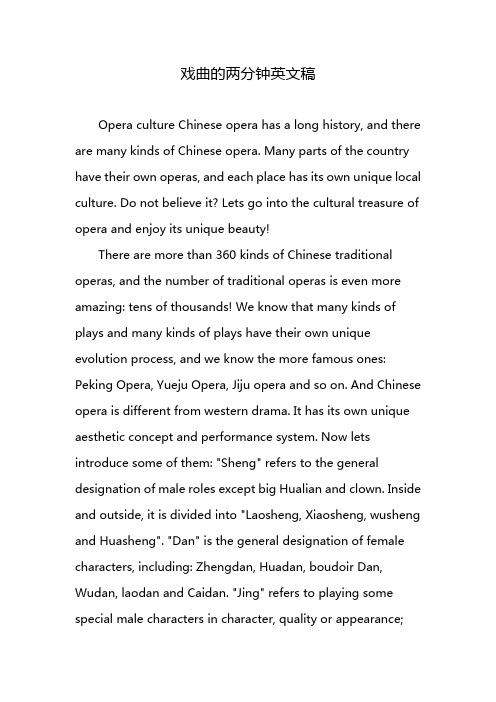
戏曲的两分钟英文稿Opera culture Chinese opera has a long history, and there are many kinds of Chinese opera. Many parts of the country have their own operas, and each place has its own unique local culture. Do not believe it? Lets go into the cultural treasure of opera and enjoy its unique beauty!There are more than 360 kinds of Chinese traditional operas, and the number of traditional operas is even more amazing: tens of thousands! We know that many kinds of plays and many kinds of plays have their own unique evolution process, and we know the more famous ones: Peking Opera, Yueju Opera, Jiju opera and so on. And Chinese opera is different from western drama. It has its own unique aesthetic concept and performance system. Now lets introduce some of them: "Sheng" refers to the general designation of male roles except big Hualian and clown. Inside and outside, it is divided into "Laosheng, Xiaosheng, wusheng and Huasheng". "Dan" is the general designation of female characters, including: Zhengdan, Huadan, boudoir Dan, Wudan, laodan and Caidan. "Jing" refers to playing some special male characters in character, quality or appearance;"Jing" is divided into singing and work-oriented Hualian; "ugly" plays a comedy role.OK? Do you think its interesting after reading it? In fact, there are many more! There are three major operas in China: Kunqu Opera, Peking Opera and Huangmei Opera. Beijing Opera is divided into four schools: Mei school, Cheng school, Gou school and Shang school. And we can see on TV that the face of the Peking opera character is very delicate. The actors face is painted with a certain color to symbolize his character and quality. The role and destiny is one of the characteristics of Peking Opera. Its function is to help the audience understand the plot. In short, red faces contain praise and represent bravery; black faces are neutral and represent fierce intelligence; blue faces and green faces are neutral and represent rash heroes; yellow faces and white faces are derogatory and represent guile; gold faces and silver faces are mysterious and represent gods and demons. Facial masks originated from religious and dance masks in ancient times, which are preserved in many local operas today.Its nice to see the introduction above! Chinas opera culture is so wonderful that it cant be said for ten days and nights! Hope we can continue to carry forward it in the future!。
英语演讲稿京剧

下面是一篇关于京剧的英语演讲稿,你可以根据需要适当修改和扩展。
---Title: Appreciating the Art of Peking OperaLadies and gentlemen, esteemed guests,Good [morning/afternoon/evening],I am honored to stand before you today to share my passion for an extraordinary and traditional form of Chinese performing arts –Peking Opera. Peking Opera, also known as京剧(Jīngjù) in Chinese, has a rich history spanning over two centuries, captivating audiences with its unique combination of music, singing, acting, and acrobatics.1. Historical Roots:Peking Opera originated in the late 18th century during the Qing Dynasty, blending elements from various regional Chinese operas. It is deeply rooted in Chinese culture and has evolved into a comprehensive art form that incorporates elements of literature, poetry, and martial arts.2. Distinctive Features:What sets Peking Opera apart is its distinctive style, characterized byelaborate costumes, colorful makeup, and highly stylized movements. The performers wear intricate costumes that represent the characters' social status, profession, and even their moral character. The elaborate face painting, known as "Lianpu," adds a layer of symbolism to the characters, reflecting their personalities and emotions.3. Four Role Types:In Peking Opera, performers are categorized into four role types: Sheng (male roles), Dan (female roles), Jing (painted face roles), and Chou (clown roles). Each role type has its own set of characteristics and techniques, contributing to the diversity and complexity of the performances.4. Musical Accompaniment:The music in Peking Opera is a crucial component, featuring traditional Chinese instruments such as the jinghu, yueqin, and percussion instruments. The music enhances the emotional expression of the characters and sets the tone for different scenes, creating a unique auditory experience.5. Cultural Significance:Beyond its artistic merits, Peking Opera holds significant cultural value. It often depicts historical events, classic literature, and moral lessons, serving as a vehicle for preserving Chinese traditions and values. It provides a glimpse into the rich tapestry of Chinese history and philosophy.6. Challenges and Preservation:While Peking Opera has a storied past, it faces challenges in the modern era. Efforts are being made to preserve and promote this cultural treasure, with initiatives to educate younger generations and introduce it to a global audience. As we navigate the ever-changing landscape of entertainment, it is crucial to recognize and support the preservation of traditional art forms like Peking Opera.In conclusion, Peking Opera is more than just a form of entertainment; it is a window into the soul of Chinese culture. Its intricate performances, rich history, and cultural significance make it a unique and invaluable art form that deserves our admiration and support. Let us embrace the beauty of Peking Opera and work together to ensure its legacy for generations to come.Thank you.---请注意,你可以根据需要对演讲稿进行修改,以使其更符合你的观点和演讲风格。
- 1、下载文档前请自行甄别文档内容的完整性,平台不提供额外的编辑、内容补充、找答案等附加服务。
- 2、"仅部分预览"的文档,不可在线预览部分如存在完整性等问题,可反馈申请退款(可完整预览的文档不适用该条件!)。
- 3、如文档侵犯您的权益,请联系客服反馈,我们会尽快为您处理(人工客服工作时间:9:00-18:30)。
戏曲英文演讲稿篇一:针砭时弊的英语演讲稿针砭时弊类作文评讲文章合为时而著,歌诗合为事而作。
好的文章,总能散发出浓郁的时代、生活气息,给人以警醒与深思。
写议论文,如果能从社会现象入手,然后追根溯源,分析事物的本质原因,那么,你的文章将绽放理性光芒。
忠告:针砭时弊,客观公正且一分为二,不走极端莫失偏颇。
由于年龄、阅历、政治素养的局限,中学生针砭时弊往往会比较绝对化,甚至会有失偏颇,这是考场作文大忌。
关注现实针砭时弊并不意味着愤世嫉俗,讽刺要分清对象,讽刺假恶丑,讴歌真善美。
同时,立意要是非分明。
应遵循的批评原则是保护经典而非颠覆经典,传承文明而非糟蹋传统,尊重人权而非侮辱人格,坚守道德而非违背道德,忠于历史而非否定历史,捍卫尊严而非精神亵渎。
佳作借鉴一拒绝平庸众多的大智慧者,在物欲横流的当今社会正走向平庸。
拒绝平庸,对他们而言,是如此必要,却又相当艰难。
还记得一年前的四月,在校礼堂聆听周国平先生演讲的情景。
我怀着一颗极为敬重的心,去感受一位写出澄明而深刻文字的哲学家的思想。
可结果很是失望,我没触摸到他的深度思考,反而感受到了,会场中充斥着的恶俗的商业味道。
没有人否认周国平先生是一位不平庸的哲学家,善从哲学的高度辨析人生和世态。
不能说他已变得平庸,只是,毋庸置疑,在那个无法用哲学气息掩盖商业味道的上午,在某种程度上他正在走向平庸。
他自己很清楚,他说:“成为一个职业作家本身就是一种堕落,一种平庸。
”但他无力拒绝。
对于有“孔雀王”之称的杨丽萍而言,现实同样如此。
当她在自己的舞剧中加入类似“亲爱的观众朋友们,你们好吗”的吆喝呐喊时,一位著名的舞评家说,这是中国舞蹈界一根脊梁的坍塌!但杨丽萍又能如何?当《云南映像》这样的精品都带动不了票房,“拒绝平庸”四个大字显得多么苍白无力,走向平庸,乃是无奈之举。
是什么,让这些大智慧者拒绝平庸变得如此艰难?答案很简单,是当下文化环境与文化品位的日渐平庸化和商业化。
在这样的文化境遇中,留给大智慧者的生存空间十分狭窄。
而就在这样狭窄的空间中,还挤占着商业利益等许多相斥之物!越来越狭小的生存空间,逼迫他们渐渐放弃自己的坚守。
因为拒绝平庸,可能意味着放弃生存的机会。
但一个时代不能没有不平庸的大智慧者,他们的精神与思考,引领大众思考的航线。
帕斯卡尔说过:“人是一棵能思想的苇草,人的全部尊严就在于他的思想。
”如果缺少了不平庸的人们的思想航标,那将会有一大批人找不到生存的意义与价值。
只是太多的人并没有意识到这个问题,他们觉得大智慧者的拒绝平庸与自己无关,于是站在一旁冷眼相看,保持着集体的冷漠。
为大智慧者提供拒绝平庸的空间,是一个时代的任务、一个民族的任务。
拒绝平庸,更是每个人的任务。
亮点赏析这篇满分作文的亮点,大致有二。
其一,目光敏锐、针砭时弊。
高考作文需要作者有一双敏锐的眼睛,从现实中寻找写作素材和灵感。
作者从周国平与杨丽萍的身上,隐隐约约看到了什么叫平庸。
一位是受人尊重的学者、作家,一位是技艺精湛的舞蹈艺术家,他们都难以拒绝平庸,这是一种令人深思的现象。
作者以此切入,对这种现象进行了猛烈的抨击。
其二,追根溯源、思想深刻。
面对崇拜的对象,他不是顶礼膜拜,而是客观认识,不是头脑发热,而是冷静思考,难能可贵的是,在批判之余还能客观分析,指出“一个时代不能没有不平庸的大智慧者,他们的精神与思考,引领大众思考的航线”,触及事物的本质,足见其思维的深度与广度。
佳作鉴赏二(XX年上海高考满分作文)他们在城市的尽头,没有繁华的街市,闪亮的霓虹;在城市的尽头,只有破旧的棚户区,有饱经生活风霜的生命;在城市的尽头,有他们这样一群人。
让我怎样称呼他们?外来务工人员子女?农民子弟?亦或是农民工二代?不,我不想用这些冰冷的名字称呼他们,我多想叫着他们带着泥土气的乳名,拉着他们的小手,走近他们的生活他们从小生长在故乡的青山绿水中,纯洁的灵魂在田野里抽穗拔节。
在山野的风中,他们奔跑着,憧憬着。
风从田野中吹过,吹进了城市,为了生计,为了未来,他们跟从父母来到了城市,在城市的尽头扎下了根。
于是习惯了青山绿水的双眸第一次触碰到了高楼大厦、车水马龙。
他们不知道怎样穿过六车道的马路,小小的手指怎么也数不清写字楼的层数。
繁华的现代文明不曾给他们带来任何快乐,这一次,却在心上烙下了深深的痕迹。
他们背起书包,小心翼翼地融入城市的生活。
可是却在“城市人”异样的眼光中,第一次明白了户口与暂住证的区别。
他们都是父母心头的宝啊!却过早地承担了不属于这个年龄的负担。
放学回家,他们做好简单的晚饭,父母还在工地或菜场上劳作;午夜醒来,泪眼中城里的星空没有家乡的明亮;悄悄许愿,希望明天他们的打工子弟小学不会因交不出电费而被查封然而,在他们日益长高的身体上,我看到了他们的成长。
记得一位记者问一个打工子弟学校的孩子,学成后是否会回到家乡时,小姑娘毫不犹豫地说:当然,一定回去!那一刻,我差点落下泪来,为他们的成长。
记得那年春晚他们稚气的宣言:“我们的学校很小,但我们的成绩不差”、“我们不和城里的孩子比爸爸。
北京的XX,也是我们的XX!”他们逐渐成熟,告别昨天的羞怯,开始迎接新的一天。
虽然,他们还在为不多的学费而苦恼;虽然,学校还是交不上水电费;虽然,还有好多体制还不够完善虽然有好多个“虽然”,但是,只有一个“但是”就足够了,已经有好多视线转向他们,他们正在茁壮地成长。
太阳从地平线上升起,照亮了城市的尽头,照亮了他们的生活。
他们,终将会成为我们。
亮点赏析:上师大附中语文特级教师余党绪、杨浦高级中学语文特级教师陈小英认为,这篇作文最为可贵之处在于,作者是一个城里的孩子,却能如此关注社会生活中那些容易被忽视的群体,不仅关注农民工孩子的物质生活,还深入到他们的心灵层面,表达了同情、理解和尊重。
作者的语言饱含感情,如,“外来务工人员子女?农民子弟?亦或是农民工二代?不,我不想用这些冰冷的名字称呼他们,我多想叫着他们带着泥土气的乳名,拉着他们的小手,走近他们的生活”“在山野的风中,他们奔跑着,憧憬着。
风从田野中吹过,吹进了城市,为了生计,为了未来,他们跟从父母来到了城市”这些语句充满了生活气息与人文气息。
余党绪指出,这篇作文的语言细腻、感性、柔软,一些典型场景和细节具有冲击力,如,“他们不知道怎样穿过六车道的马路,小小的手指怎么也数不清写字楼的层数”“他们背起书包,小心翼翼地融入城市的生活。
可是却在‘城市人’异样的眼光中,第一次明白了户口与暂住证的区别”,一个中学生,对另一个与自己相距甚远的群体能有如此体察,很不容易。
这篇作文中不少语言很有诗意。
陈小英列举,“他们从小生长在故乡的青山绿水中,纯洁的灵魂在田野里抽穗拔节”,能写出这样的语句,在中学生中是很少见的。
现在的学生普遍不注意观察生活细节,描写能力弱,所以老师看学生作文经常会觉得“没劲”。
而这篇作文里的语句,给人清新、质朴之感。
文章的高明之处还在于,虽然写了农民工子女的生存压力,心理压力,但整篇文章基调积极向上,不是一味写困境,还写到这些孩子正受到越来越多的关注,正在茁壮成长。
上海市教育考试院分析今年的作文题目《他们》时指出,今年的命题作文激活思辨,作文题“他们”,构成整张试卷一个亮点。
写“他们”,既使命题有效地与以往的各种习作区分出来,也是以全新的视角,激活考生的情感与思考,引导考生走出个体和小我,学会关注他人,学会以多元视野关注社会。
阅卷专家分析说:“这篇文章的高明之处,就在于视角独特,关注农民工的人很多,但是关注农民工子女的人却很少。
作文在客观描述、合理想象之中又饱含真情实感,不愧为上乘之作。
”这篇作文把思想深度用朴实的文字表现出来,全文没有华丽的词藻,也没有时尚的包装,但是立意高,角度新,字里行间透露出很强的社会责任感,引发了阅卷者内心的共鸣。
而文章的最点睛之笔就是最后一句:“他们,终将会成为我们。
”考生没有一味抱怨,写出了变化和希望。
佳作鉴赏三(XX年北京高考满分作文)我有一双隐形的翅膀看到这个作文题目,我笑了,监考老师有点紧张,他没见过一个男生笑得花枝乱颤的样子。
我感到有点搞笑,竟然差点猜到了题目。
我本来押了一道《给北大校长的一封信》,因为那位刚刚退下的北大校长,曾对他的学生们唱起《隐形的翅膀》,一夜之间成为青春期男女生的偶像。
一位儒雅的校长,带着对学生们的理解和爱,一同唱起自强不息的歌曲,这是一幅多么温馨的画面。
而能到他的大学里读书,又将是一件幸福无边的事情。
他老人家,在学生的心里插上了一双翅膀。
我明白出题老师的一片好心,他们是想说,只要你努力,所有的丑小鸭、灰姑娘和自卑者,都会有一双隐形的翅膀,去实现你小心灵里满载着的梦想。
只是这样励志的题目,给我们北京的考生有些可惜了。
看到一位三轮车夫被城管拦截,要夺下他赖以为生的三轮车,我一瞬间也会有一些羞愧。
他的车子被夺走之后,他的儿子或者女儿也许就没法再上学,那也许是一个优秀的高中生,就这样被剥夺了上学的权利。
这是因为我有一双隐形的翅膀而他没有?所以我永远能比别人飞得更高?说到现在,您应该明白我在说什么。
外地的中学经常出现高考舞弊案,这里几乎没有;外地的孩子经常因异地高考被查获,这里从来没有;外地的孩子经常创下复读的纪录,这里很少复读;外地的孩子上北大要分数惊人,这里的孩子还没考已平添很多分...... 这是因为,作为北京的孩子,我有一双隐形的翅膀而他们没有。
我有一双隐形的翅膀,我不必用力展翅就能在天空飞翔,这难道预示着,我一出生就是比同类更高贵的鸟儿?但为什么我一点都不感到骄傲,相反却时时感到自卑?有一本书说过,所有动物一律平等,但有些动物比其他动物更加平等。
这“有些动物”,就是有一双隐形的翅膀的人?佳作鉴赏四(XX年江苏高考满分作文)品味时尚当人们的血脉中奔流着各色汽水饮料时,似乎再有哦没有一杯香茗高山流水般诗意地流淌的踪迹。
当人们恣意地将头发烫染得卷曲蓬松,五彩斑斓时,似乎大家忘记了自己原本拥有一头乌黑亮丽的的秀发。
当人们开始将衣服穿薄,甚至“衣不蔽体”、奇形怪状时,似乎特立独行成了时代的标签。
老祖宗的含蓄之美渐渐让步于时尚装扮。
当人们以车代步,进入了电动马达四轮的新纪元,似乎很少有人在月亮下闲庭信步,边走边欣赏,感受城市霓虹下最温存的拥揽。
似乎没有人用脚步去丈量脚下的土地,感知生命的重量与自然的厚实。
当人们用电邮、用短讯、用视频支起了整个地球村,住了这个偌大的城市,似乎人们丢失了驿寄梅花,鱼传尺素的期待与盼望。
鸿雁飞过,丝毫没有等待的不安与渴望。
咫尺与天涯丢失了那份如同生死别离般的重量。
当人们开始流行在饭店吃年夜饭,一家人聚在喧闹的酒店大厅时,人们似乎没有发现少了一份紧密,少了一份拥挤的温馨。
没有了忙忙碌碌的筹备,便少了互相帮上一手的暖暖之语。
没有了锅碗瓢盆的铿锵交响,便听了过年的“滋味”。
